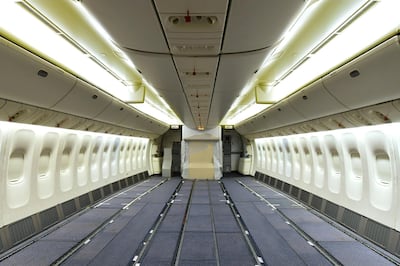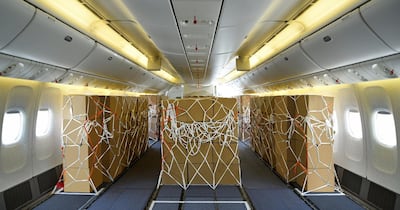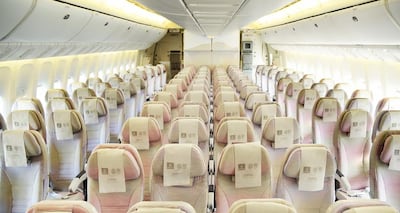Emirates has shared a behind-the-scenes look at how it's increasing its cargo capacity – by removing seats from its economy cabins.
The Dubai airline's SkyCargo arm has removed the seats in 10 of its Boeing 777-300ER aircraft to meet the strong air cargo demand across the world.
They will be used to transport essential commodities such as personal protective equipment, pharmaceuticals, medical equipment, food, machinery and other supplies around the world.
The modified economy cabins allow for 17 tonnes, or 132 cubic metres, of extra cargo capacity per flight – on top of the 40 to 50-tonne capacity in the belly hold.
Engineers are working to convert the 10 aircraft in Dubai, with each requiring almost 640 hours of work between 11 engineers for the modification. The process involves removing 305 economy seats, fixing the equipment to the floor safely, and carrying out load-bearing tests. First and business class remain untouched.
Seven aircraft have already been modified, with three more aircraft due to be ready by mid-July.
By the end of the project, the Emirates engineering team will have removed 3,050 seats. The seats will be "safely and hygienically" stored until the planes are required for passenger services, when they will be refitted into the aircraft.
Previously, extra cargo had been transported in the belly hold, as well as in overhead bins and on top of passenger seats. Removing the seats altogether is taking things one step further, Nabil Sultan, Emirates divisional senior vice president, Cargo says.
“Since the start of the Covid-19 pandemic, Emirates SkyCargo has taken very seriously its responsibility of connecting people and businesses across the world with the commodities that they urgently require. To this end, we have been working flat out, first to re-connect a global network of more than 85 destinations and then to introduce capacity options that fit what our customers demand from us."
However, Emirates SkyCargo has strict rules on the type of cargo that can be loaded inside the modified cabins. These mean the cargo will primarily be PPE, medical clothing and pharmaceuticals, and perishables such as cut flowers, and some fruits and vegetables that can be maintained within a temperature range of 15 and 25 degrees Celsius. Cargo loaded in the passenger cabins will be packed in an external container such as a plastic or cardboard box, in accordance with the latest IATA regulations.
_________________
Read more:
Flydubai resumes flights to 24 cities and aims to reach 66 destinations by end of summer
Summer travel: Where can I book a holiday?
Coronavirus: Dubai's new travel rules and testing explained
_________________
Key facilities
- Olympic-size swimming pool with a split bulkhead for multi-use configurations, including water polo and 50m/25m training lanes
- Premier League-standard football pitch
- 400m Olympic running track
- NBA-spec basketball court with auditorium
- 600-seat auditorium
- Spaces for historical and cultural exploration
- An elevated football field that doubles as a helipad
- Specialist robotics and science laboratories
- AR and VR-enabled learning centres
- Disruption Lab and Research Centre for developing entrepreneurial skills
Conflict, drought, famine
Estimates of the number of deaths caused by the famine range from 400,000 to 1 million, according to a document prepared for the UK House of Lords in 2024.
It has been claimed that the policies of the Ethiopian government, which took control after deposing Emperor Haile Selassie in a military-led revolution in 1974, contributed to the scale of the famine.
Dr Miriam Bradley, senior lecturer in humanitarian studies at the University of Manchester, has argued that, by the early 1980s, “several government policies combined to cause, rather than prevent, a famine which lasted from 1983 to 1985. Mengistu’s government imposed Stalinist-model agricultural policies involving forced collectivisation and villagisation [relocation of communities into planned villages].
The West became aware of the catastrophe through a series of BBC News reports by journalist Michael Buerk in October 1984 describing a “biblical famine” and containing graphic images of thousands of people, including children, facing starvation.
Band Aid
Bob Geldof, singer with the Irish rock group The Boomtown Rats, formed Band Aid in response to the horrific images shown in the news broadcasts.
With Midge Ure of the band Ultravox, he wrote the hit charity single Do They Know it’s Christmas in December 1984, featuring a string of high-profile musicians.
Following the single’s success, the idea to stage a rock concert evolved.
Live Aid was a series of simultaneous concerts that took place at Wembley Stadium in London, John F Kennedy Stadium in Philadelphia, the US, and at various other venues across the world.
The combined event was broadcast to an estimated worldwide audience of 1.5 billion.
Company Profile
Name: Thndr
Started: 2019
Co-founders: Ahmad Hammouda and Seif Amr
Sector: FinTech
Headquarters: Egypt
UAE base: Hub71, Abu Dhabi
Current number of staff: More than 150
Funds raised: $22 million
England v South Africa Test series:
First Test: at Lord's, England won by 211 runs
Second Test: at Trent Bridge, South Africa won by 340 runs
Third Test: at The Oval, July 27-31
Fourth Test: at Old Trafford, August 4-8
Volvo ES90 Specs
Engine: Electric single motor (96kW), twin motor (106kW) and twin motor performance (106kW)
Power: 333hp, 449hp, 680hp
Torque: 480Nm, 670Nm, 870Nm
On sale: Later in 2025 or early 2026, depending on region
Price: Exact regional pricing TBA
Global state-owned investor ranking by size
|
1.
|
United States
|
|
2.
|
China
|
|
3.
|
UAE
|
|
4.
|
Japan
|
|
5
|
Norway
|
|
6.
|
Canada
|
|
7.
|
Singapore
|
|
8.
|
Australia
|
|
9.
|
Saudi Arabia
|
|
10.
|
South Korea
|



